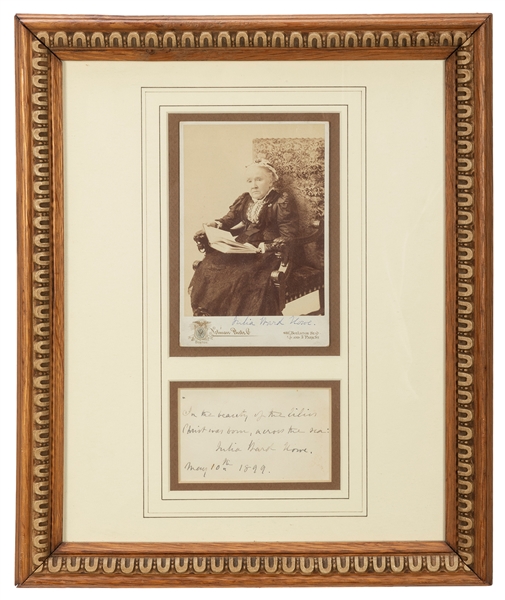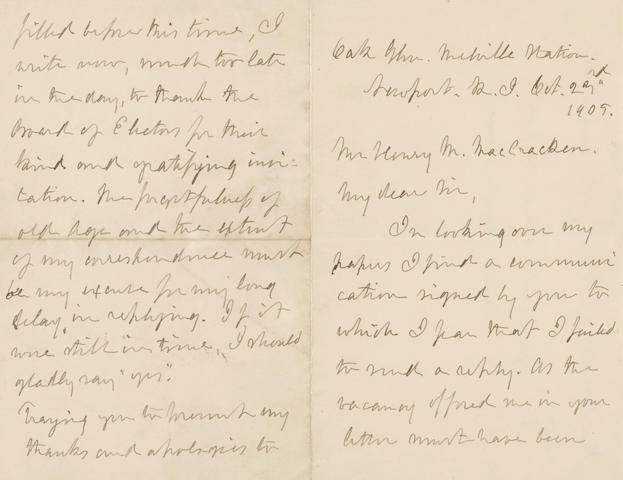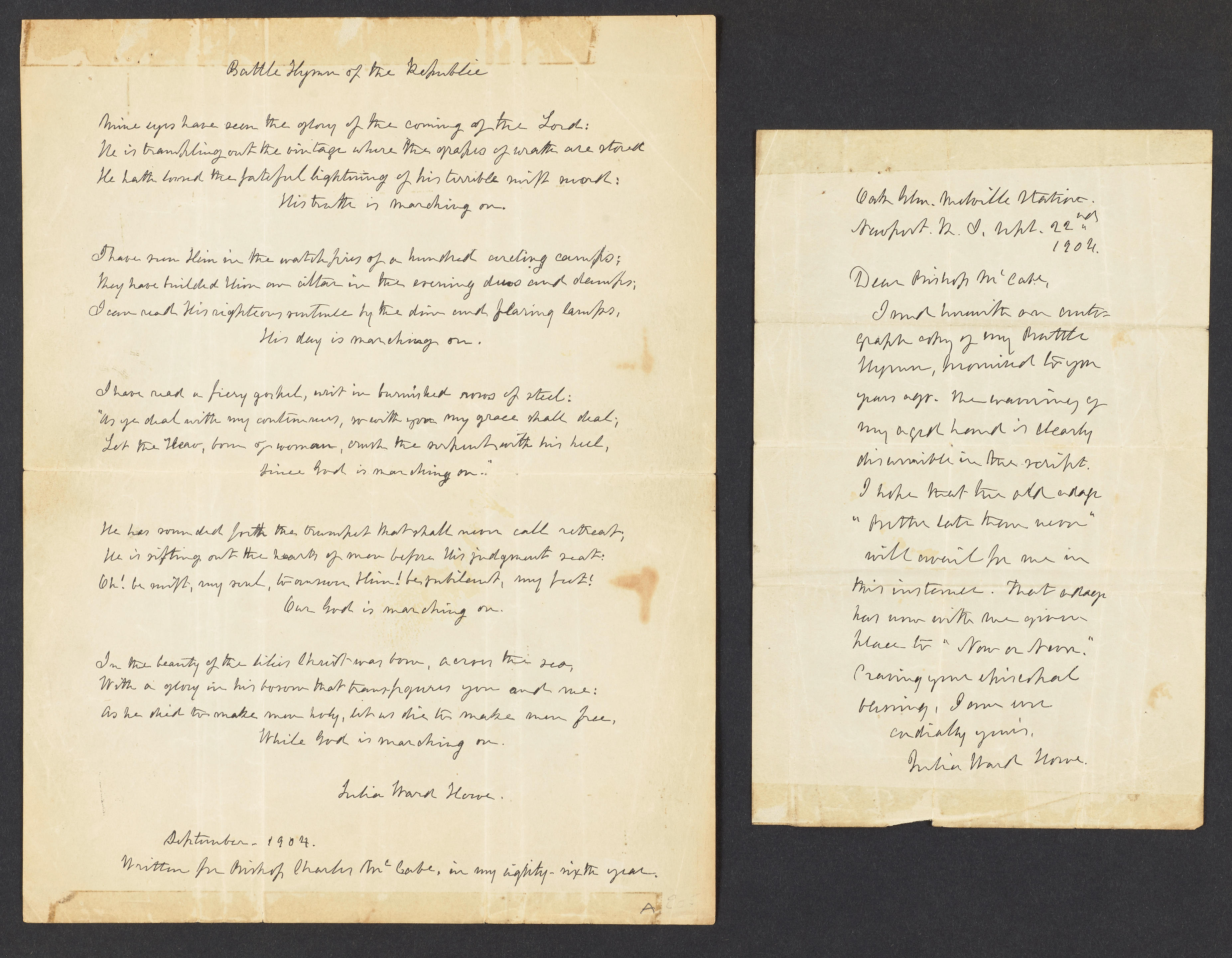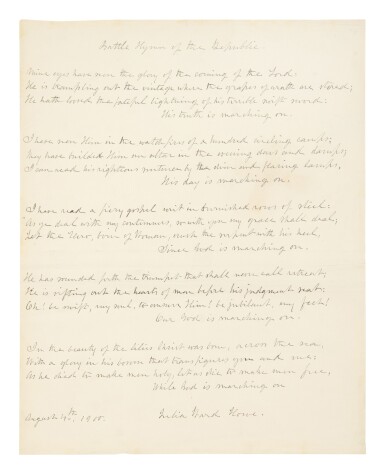HOWE, Julia Ward (1819-1910). Autograph manuscript signed and inscribed, constituting the original draft of "The Battle Hymn of the Republic," [Willard's Hotel, Washington D.C.], [the night of 18-19] November 1861. 4 pages, 4to, in ink on her husband's printed stationery of the Sanitary Commission, Washington D.C., first page labeled by Howe: "First draft of the "Battle/Hymn of the Republic." By Julia Ward Howe Washington Nov. 1861," page 2 with her inscription: "Willard's Hotel Julia Ward Howe to Charlotte B. Whipple"; the two leaves partially separated, enclosed in a custom-fitted dark red morocco gilt folding protective case by Sangorski and Sutcliffe .
HOWE, Julia Ward (1819-1910). Autograph manuscript signed and inscribed, constituting the original draft of "The Battle Hymn of the Republic," [Willard's Hotel, Washington D.C.], [the night of 18-19] November 1861. 4 pages, 4to, in ink on her husband's printed stationery of the Sanitary Commission, Washington D.C., first page labeled by Howe: "First draft of the "Battle/Hymn of the Republic." By Julia Ward Howe Washington Nov. 1861," page 2 with her inscription: "Willard's Hotel Julia Ward Howe to Charlotte B. Whipple"; the two leaves partially separated, enclosed in a custom-fitted dark red morocco gilt folding protective case by Sangorski and Sutcliffe . "THE BATTLE HYMN OF THE REPUBLIC": THE POET'S ORIGINAL DRAFT OF THE BEST-KNOWN AMERICAN HYMN, WITH A DISCARDED STANZA; WRITTEN IN SEMI-DARKNESS THE NIGHT AFTER HER VISIT TO LINCOLN AND A TOUR OF BATTLE LINES NEAR WASHINGTON D.C. An exceptional and unique working manuscript of the most inspired and stirring of all American hymns, composed by Howe under striking circumstances during the early days of the Civil War. In November 1861 Governor John A. Andrew of Massachusetts entertained a party from his state on a twelve-day visit to Washington D.C. The party included Dr. Samuel Gridley Howe, employed with the relief work of the Sanitary Commission (a precursor of the Red Cross), his wife Julia Ward Howe, a poet and ardent Abolitionist, and the Reverend James Freeman Clarke. In her later Reminiscences, Julia confessed that "a feeling of discouragement came over me as I drew near the city of Washington. I thought of the women of my acquaintance whose sons or husbands were fighting our great battle; the women themselves serving in the hospitals, or busying themselves with the work of the Sanitary Commission. My husband was beyond the age of military service, my eldest son but a stripling; my youngest was a child of not more than two years. I could not leave the nursery to follow the march of our armies, neither had I the practical deftness which the preparing and packing of sanitary stores demanded. Something seemed to say to me, 'You would be glad to serve, but you cannot help anyone; you have nothing to give, and there is nothing for you to do.'" Lodging at Willard's Hotel on Pennsylvania Avenue, they found the Union capital--only a few miles from the Confederate advance posts--full of marching troops and ringing with rumor and news from the battlefields. In an interview with President Lincoln, Mrs. Howe was especially struck by "the sad expression of Mr. Lincoln's deep blue eyes." On November 18, the Governor and Howe's party crossed the Potomac to observe a review of troops. Just as the review got under way, Confederate skirmishing parties and sharpshooters went into action. Julia recalled: "While we were engaged in watching the manoeuvres, a sudden movement of the enemy necessitated immediate action. The review was discontinued, and we saw a detachment of soldiers gallop to the assistance of a small body of our men who were in imminent danger of being surrounded and cut off from retreat. The regiments remaining on the field were ordered to march to their cantonments. We returned to the city very slowly, of necessity, for the troops nearly filled the road. My dear minister [Rev. Clarke] was in the carriage with me, as were several other friends. To beguile the rather tedious drive, we sang from time to time snatches of the army songs so popular at that time, concluding, I think, with 'John Brown's body lies a-mouldering in the ground; his soul is marching on.' The soldiers seemed to like this, and answered back, 'Good for you!' Mr. Clarke said, 'Mrs. Howe, why do you not write some good words for that stirring tune?' I said that I had often wished to do this, but had not as yet found in my mind any leading toward it." In other accounts, it was Mrs. Howe's husband who asked her to compose new verses to the tune; Mrs. Howe's version is likely the correct one. If inspiration h
HOWE, Julia Ward (1819-1910). Autograph manuscript signed and inscribed, constituting the original draft of "The Battle Hymn of the Republic," [Willard's Hotel, Washington D.C.], [the night of 18-19] November 1861. 4 pages, 4to, in ink on her husband's printed stationery of the Sanitary Commission, Washington D.C., first page labeled by Howe: "First draft of the "Battle/Hymn of the Republic." By Julia Ward Howe Washington Nov. 1861," page 2 with her inscription: "Willard's Hotel Julia Ward Howe to Charlotte B. Whipple"; the two leaves partially separated, enclosed in a custom-fitted dark red morocco gilt folding protective case by Sangorski and Sutcliffe .
HOWE, Julia Ward (1819-1910). Autograph manuscript signed and inscribed, constituting the original draft of "The Battle Hymn of the Republic," [Willard's Hotel, Washington D.C.], [the night of 18-19] November 1861. 4 pages, 4to, in ink on her husband's printed stationery of the Sanitary Commission, Washington D.C., first page labeled by Howe: "First draft of the "Battle/Hymn of the Republic." By Julia Ward Howe Washington Nov. 1861," page 2 with her inscription: "Willard's Hotel Julia Ward Howe to Charlotte B. Whipple"; the two leaves partially separated, enclosed in a custom-fitted dark red morocco gilt folding protective case by Sangorski and Sutcliffe . "THE BATTLE HYMN OF THE REPUBLIC": THE POET'S ORIGINAL DRAFT OF THE BEST-KNOWN AMERICAN HYMN, WITH A DISCARDED STANZA; WRITTEN IN SEMI-DARKNESS THE NIGHT AFTER HER VISIT TO LINCOLN AND A TOUR OF BATTLE LINES NEAR WASHINGTON D.C. An exceptional and unique working manuscript of the most inspired and stirring of all American hymns, composed by Howe under striking circumstances during the early days of the Civil War. In November 1861 Governor John A. Andrew of Massachusetts entertained a party from his state on a twelve-day visit to Washington D.C. The party included Dr. Samuel Gridley Howe, employed with the relief work of the Sanitary Commission (a precursor of the Red Cross), his wife Julia Ward Howe, a poet and ardent Abolitionist, and the Reverend James Freeman Clarke. In her later Reminiscences, Julia confessed that "a feeling of discouragement came over me as I drew near the city of Washington. I thought of the women of my acquaintance whose sons or husbands were fighting our great battle; the women themselves serving in the hospitals, or busying themselves with the work of the Sanitary Commission. My husband was beyond the age of military service, my eldest son but a stripling; my youngest was a child of not more than two years. I could not leave the nursery to follow the march of our armies, neither had I the practical deftness which the preparing and packing of sanitary stores demanded. Something seemed to say to me, 'You would be glad to serve, but you cannot help anyone; you have nothing to give, and there is nothing for you to do.'" Lodging at Willard's Hotel on Pennsylvania Avenue, they found the Union capital--only a few miles from the Confederate advance posts--full of marching troops and ringing with rumor and news from the battlefields. In an interview with President Lincoln, Mrs. Howe was especially struck by "the sad expression of Mr. Lincoln's deep blue eyes." On November 18, the Governor and Howe's party crossed the Potomac to observe a review of troops. Just as the review got under way, Confederate skirmishing parties and sharpshooters went into action. Julia recalled: "While we were engaged in watching the manoeuvres, a sudden movement of the enemy necessitated immediate action. The review was discontinued, and we saw a detachment of soldiers gallop to the assistance of a small body of our men who were in imminent danger of being surrounded and cut off from retreat. The regiments remaining on the field were ordered to march to their cantonments. We returned to the city very slowly, of necessity, for the troops nearly filled the road. My dear minister [Rev. Clarke] was in the carriage with me, as were several other friends. To beguile the rather tedious drive, we sang from time to time snatches of the army songs so popular at that time, concluding, I think, with 'John Brown's body lies a-mouldering in the ground; his soul is marching on.' The soldiers seemed to like this, and answered back, 'Good for you!' Mr. Clarke said, 'Mrs. Howe, why do you not write some good words for that stirring tune?' I said that I had often wished to do this, but had not as yet found in my mind any leading toward it." In other accounts, it was Mrs. Howe's husband who asked her to compose new verses to the tune; Mrs. Howe's version is likely the correct one. If inspiration h



.jpg)










Try LotSearch and its premium features for 7 days - without any costs!
Be notified automatically about new items in upcoming auctions.
Create an alert